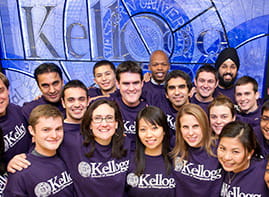Patience has been a virtue for Peter Simmie, who founded a successful business in his 60s
11/18/2015 -
Editor's Note: In the Start Me Up series, the Kellogg School spotlights members of the Kellogg community who are bringing bold entrepreneurial visions to life.
For Peter Simmie ’75, all the pieces of his professional puzzle fell into place in his 60s.
Simmie’s career has ranged widely across several fields and pursuits, from politics to teaching to venture capitalism. But in 2009, when he was in his early 60s, Simmie co-founded
Bristol Gate U.S. Equity Fund, a Toronto-based asset management company serving institutional and high net worth clients.
The core U.S. Equity Strategy invests in 22 dividend-paying stocks that are members of the Standard and Poor’s 500 and rank in the S&P’s top 5 percent in dividend growth. Members must have raised their payout by at least 15.5 percent the previous year and have excellent prospects for continuing at that pace.
The idea came to Simmie after the Canadian investment firm he worked for was bought out in 2005. He was a senior officer and portfolio manager with the firm and had been there 10 years, but “I didn’t see much of a future for me” with the new company, Simmie says.
Simmie left and co-founded Bristol Gate Capital Partners the following year with his partner, Richard Hamm. The two developed their dividend growth strategy over the course of 2007 and approached a large Canadian bank with the idea. But the market turbulence of the period delayed the involvement of potential clients. So they launched the fund with their own money in 2009.
Their investment has paid off handsomely. Bristol Gate Capital Partners now has 12 employees, and the fund’s gross annualized return, from May 2009 through July 2015, was 21.81 percent with a net return of 19.62 percent. The fund now has more than $650 million in assets under management. Simmie expects it to exceed $1 billion within two quarters.
His strategy for achieving these results originated with a simple insight: There is a strong relationship between a stock’s price and its dividend payouts.
“This has been a good idea for a long time — I mean, decades,” says Simmie, who is based in Toronto and is Bristol Gate’s chief investment officer. “So why doesn’t everybody use it? I guess they’re not interested in five percent over the market on a continuous basis.”
Focus on fundamentals
He makes it sound simple, but Simmie knows that there is a temptation to be sidetracked by strategies that mistake complexity for effectiveness.
“You learn by observing what’s working and what isn’t working, and you go step-by-step,” Simmie says. “Sticking with what you know how to do and not deviating from it is the secret sauce. You don’t make it complicated.”
Keeping things simple has meant rejecting two pieces of commonly-held wisdom.
One is that properly diversifying means holding a large number of stocks. “My experience in the industry said that you don’t need to have a lot of stocks to have a well-diversified portfolio,” Simmie says. “When we are compared to what people think are comparable investment companies, they usually have way more stocks than we have. And you know what? They don’t have less risk. They just have more stocks.”
Simmie’s other against-the-grain insight? High risk is not necessarily the key to high reward. His focus on investment grade companies with strong dividend growth has allowed his fund to deliver high rewards with low risk. But the payoff requires some patience.
“It’s taken my whole business career to learn that if you can double your money in five years by making 15 percent each year, guess what? You get to have a whole lot of money after 15 or 20 years,” Simmie says.
‘Everything is connected’
Simmie, who served on the Kellogg Alumni Council from 2009 to 2013, points to a marketing class he took during his graduate work at Kellogg, taught by Louis Stern, the John D. Gray Professor Emeritus of Marketing, as an important building block in his back-to-basics philosophy.
“A lot of people thought that marketing was advertising,” Simmie says. “Lou would say, ‘No, marketing is everything. You’ve got channels of distribution. You’ve got to put your stuff on the shelves. You’ve got to have an inventory management system.’
“What I learned out of that is that everything is connected. You can lose money by getting off your game and buying things that don’t fit into the pattern that your research has told you to buy into.”
Simmie cites one particular member of his fund, Tractor Supply Co., as a company that shares his steady-as-she-goes approach.
“I love that you can build a several-thousand-store business out of cash flow over [a few] decades,” Simmie says. “What do you learn out of that? Well, how about building your business step by step. Tractor Supply innovates all the time, but it never bets the business on any innovation.”
It’s the same strategy Simmie has used to get to where he is today: forging his own path forward by relying on the lessons of experience. “Look at the data and trust it,” he says. “And if you can’t trust the data, then go back and find out why you can’t. And trust the decision rules that the data lead you to.”
Read more in the Start Me Up Series:






